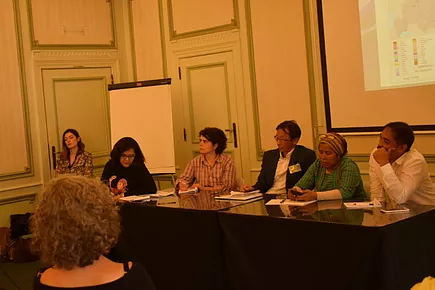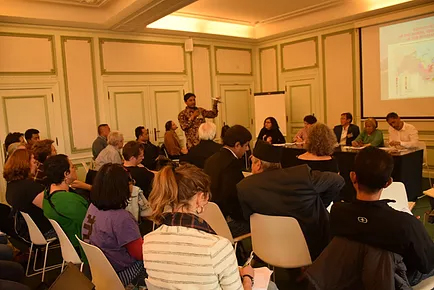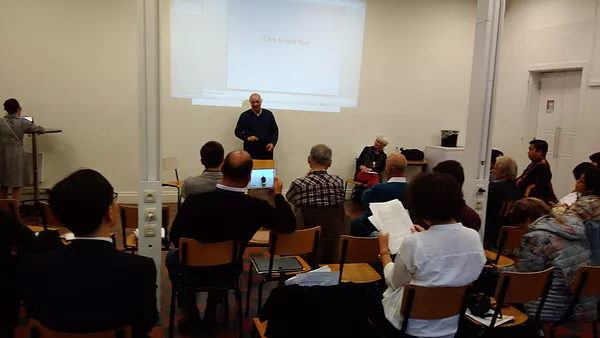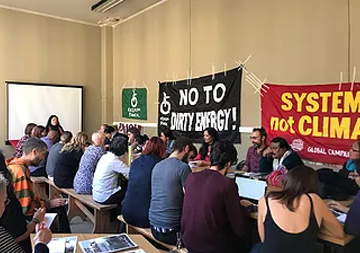AEPF 12 - Day 2
On Day 2 of the AEPF there was intense discussion in six thematic clusters. The background to all the discussion was the impact of policies Of the last two decades of neoliberal growth, growing inequality and growing power of trans national corporations. In addition there has been the rise of many extremist forces and national security obsessed policies of many governments. The cost of these policies on climate change and ecological damage as human security and well being formed the cross cutting concern.
Democracy and human rights
This cluster focussed on the ground reality, where in many Asian, European and other countries, thousands of activists and human rights defenders are struggling to survive the suspension of constitutional rights and rule of law, even as judicial processes become a means of punishing trials and tribulations. Further vigilante forces use mob violence and get impunity from ruling regimes.
This cluster had detailed discussions on the problems faced by migrants. They asked for just policies concerned with human dignity of migrants and refugees. This cluster did a analysis of fundamentalisms and all forms of violent extremisms, and also showed that hoe policies to counter these also violated rights.
Social Justice
Experts and activists gave various arguments that disproved the rationale given by multilateral agencies and governments for the ongoing privatisation of social services, i.e., lack of funds, inefficiency, bureaucratization, government monopolization. Evidence on the contrary shows that that private public partnerships (PPPs) are more expensive, generate more profit, are more corrupt, less efficient and less sustainable than using public finance, co-operative holding, management and delivery.
Speakers showed that there were now thousands of examples where municipalities along with local people have effectively and collectively taken over basic public services from water, energy, transport.
The social justice cluster adopted a Charter That proposes to: “Work with social movements and workers’ organisations to develop a people-centred Global Social Protection Charter that will guarantee decent work, sustainable livelihoods, and universal and comprehensive social protection systems that include food, essential services and social security.”
This cluster proposed that all countries have legislation to ensure that people have a rights to public services that are institutionalized and insulated from market forces and political patronage. It was also proposed that:
The objectives of governments, should be universal, free and quality health care, free education up to the tertiary level, affordable decent public housing, a living requirement for water and energy, as well as affordable and reliable transport.
Public services should be financed by governments by building the political will to enforce real progressive taxation and abandoning unjust tax policies which allow the rich to hide their wealth through tax havens and illegal money flows.
PPPs should be abandoned in favour of public-poor-partnerships. Local communities should be encouraged to participate fully in the planning, implementation and oversight of projects.


Climate Justice and Just Transition
The speakers in the climate justice cluster, called for immediate and urgent action to stop global temperatures from rising. The crucial message from this cluster is that: “The climate crisis is escalating further and will reach catastrophic levels at a planetary scale unless urgent actions in every country and in a global scale are undertaken.” Speakers emphasised that these actions must lead to profound transformation of the global system which is the root cause of the climate crisis. They proposed that steps to be taken from transformation of energy systems – away from the production and consumption of fossil fuels; limit the rise of global temperature We are keen to follow and act with activists on related questions.


Trade Justice & Corporate Accountability
In this cluster, the speakers said that the huge power of TNCs has resulted in monopoly of control and exploitation of natural resources that impacts people’s access to land, water and sea as the source of their livelihood. This power is increasing through economic globalization and the vehicle of free trade and investments agreements.
The participants and speakers called for a conceptualisation and public action on: First, reclaim people’s rights (#ReclaimOurRights); and Second reclaim people’s economy sovereignty (#ReclaimOurEconomy) This involves reclaiming peoples’ rights, actions by generating knowledge and public action on (1) the free trade agenda and (2) corporate power and impunity.
The experts agreed that there were human rights violations in both politics and in the economy. In relation with FTAs implementation, it was proposed that Parliaments should have the power to assess the negotiation results on the bases of these impact assessments and these be framed within a human rights framework.
In relation with the Constitutional lawsuits over trade and investment agreements the experiences from the CSOs lawsuit against FTAs should be documented by the movements and CSOs and we can use these for advocacy and provide information to policy makers. We will work with AEPF on Trade and Investment and the Binding Treaty.
Food Sovereignty and Natural Resource Justice
The analysis and ideas proposed by AEPF were linked with the Emancipatory Rural Politics Initiative (ERPI) – that aims to encourage debate and action among scholars, activists, and policymakers concerned with issues related to rural and peasant distress and possible alternative policies are urgent and timely, especially because of exclusionary rural politics. It was decided to work with AEPF on these issues.


Peace and Security Cluster
Peace activists and speakers in this cluster, recognised that peace movements have had a positive input in the adoption of the legally-binding treaty to ban nuclear weapons (2017); the peace process in the Koreas; Mongolia accepting nuclear free status:and collaborating with civil society; Security Council Resolution 1325.
However the concerns were expressed about continuation armed conflicts, military interventions, proliferation of nuclear weapons; terrorism, politicized religious fundamentalism, enforced displacement; severe refugee crisis; xenophobia populisms and the rise of the militant right wing; militarization of land, seas and space.
Speakers agreed to continue to put pressure that nuclear-weapon states to immediately enter, sign, ratify and implement the Treaty on the Prohibition of Nuclear Weapons; take serious steps to cut military expenditures. The cluster asked for negotiations in major hot spots like West Asia; encourage peaceful resolution of disputes in the South China Sea in accordance with international law, notably the UN Charter and UNCLOS.

All the clusters showed that on all these issues concerning rights, democracy, climate, environment, protection of refugees, and all kinds of justice, there were peoples resistance. Despite the pressure and campaign to silence and suppress thousands of human rights defenders, students, activists and concerned citizens continue to stand their ground and continue to struggle to assert and protect inalienable rights and freedoms.



